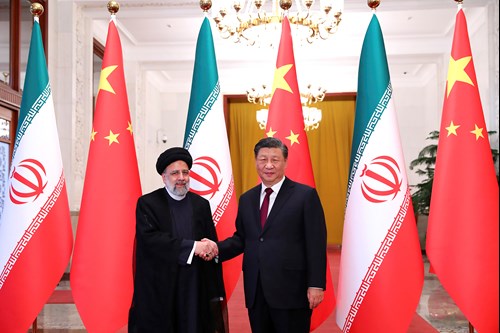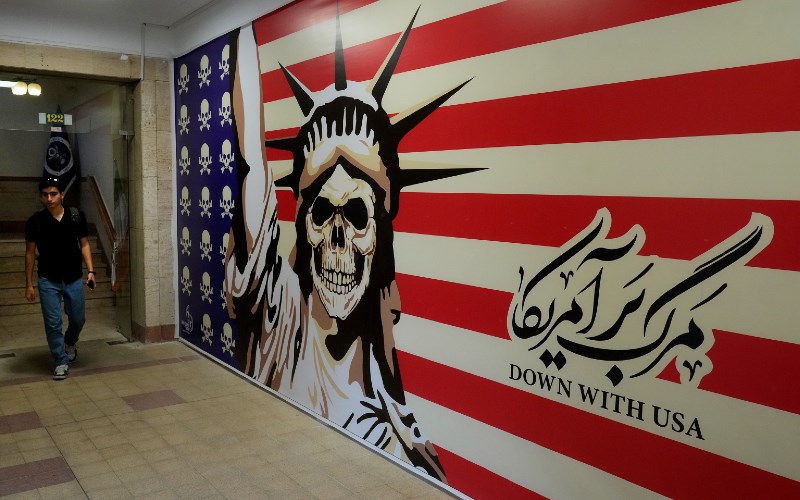Formed just before Christmas last month, Operation Prosperity Guardian was developed as a multinational maritime task force led by the United States to respond to Houthi-led attacks against ships in the Red Sea. A Pentagon spokesman described the goal of the partnership as a step towards "furthering our shared goals of security and stability throughout the Middle East."
Col. Grant Newsham (USMC-Ret.), who once served as the first Marine liaison officer to the Japan Ground Self-Defense Force, tells American Family News "the fact a protective military operation is even necessary reveals the United States has problems that go far beyond the Red Sea."
Newsham, how a senior fellow at the Center for Security Policy, contends the broader takeaway is that America's enemies "are not afraid of the United States or Team Biden." He points out that "the Red Sea troubles are directly tied to the Gaza war that began on October 7, and Iran both supported Hamas and gave the go-ahead for the attack on Israel."

According to Newsham, this signals that "Tehran was apparently unafraid of a U.S. response to this aggression." The Houthi insurgents who are attacking shipping and U.S. warships in the Red Sea, while also launching missiles at Israel, are proxies of Iran, he explains. "[They] are presumably acting on Iran's orders and with Iranian guidance and support."
Newsham is appalled at the action, pointing out that Iran is threatening to close off a major international trade artery, and has in fact partially closed it. "And they're apparently unconcerned with what the United States might do in response," he adds.
Newsham admits being shocked by Iran's audacity, but not surprised.
"The Biden administration's Iran policy seems to be based on appeasement," he explains. "It has provided Iran with billions of dollars and ignored sanctions to allow Tehran to earn tens of billions more."
And while Iran is a legitimate concern for the United States, Newsham argues that America's "biggest threat" is China. Interestingly, he points out, "China buys Iranian oil – providing Iran with funds – despite U.S. sanctions prohibiting such transactions."
 Without risk of punishment, Nesham says, "It's business as usual with China as Washington sees it, [so] no wonder the People's Republic of China (PRC) is unafraid of Team Biden."
Without risk of punishment, Nesham says, "It's business as usual with China as Washington sees it, [so] no wonder the People's Republic of China (PRC) is unafraid of Team Biden."
This, he says, is more than simply being afraid of American displeasure. "It's as much a lack of respect for the United States and the Biden administration," he explains, thus allowing Iran to support terrorism, including operations conducted by Hamas.
Lukewarm response
For Newsham, the response to U.S. requests to join Operation Prosperity Guardian have been "lukewarm." Few countries are sending ships or aircraft to join the coalition.
"Even America's stalwart ally, Australia, which depends on international shipping and the Red Sea route in particular, declined to do anything more than send some staff officers to assist," Newsham laments. "No warships or aircraft; not even one."
"A handful of nations are joining with a few ships and personnel, while others such as the French and Spanish are in the area but maintaining a distance from the actual U.S. operation," he adds.
According to Newsham, Japan is also "standing back." Considering how much Japan depends on Middle East oil, international shipping, and U.S. military protection, he argues, "this is clear evidence of how they view the Biden administration."
In addition, he says there are countries that don't want to publicly announce their involvement. "That's not exactly a sign of confidence in U.S. power and influence," he notes.
Dwindling respect
A lack of respect for America will have a broader, global impact, Newsham warns. "If your enemies aren't afraid of you, and your friends – actual or erstwhile – don't respect you or have confidence in you, that's dangerous," he shares.
He cites Russia continuing its attacks in Ukraine, as well as Beijing keeping Taiwan "in the crosshairs."
"The PRC has announced it will be turning up the heat on Japan's southern islands, daring the Japanese to respond," he tells AFN. "So, you can imagine what North Korea must be thinking, perhaps only a degree more afraid of the United States than are the Houthis. [In addition], the Venezuelan dictatorship that's closely tied to the PRC is angling to seize most of neighboring Guyana and its oil."
Noting all these examples, he asks: "Is anyone afraid of the United States? Ruthless, aggressive dictatorships can smell this weakness. This is dangerous, to say the least."







